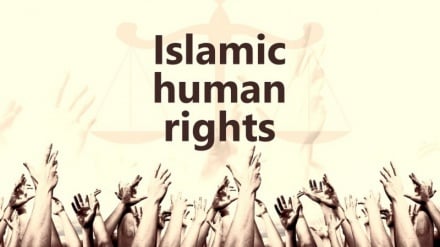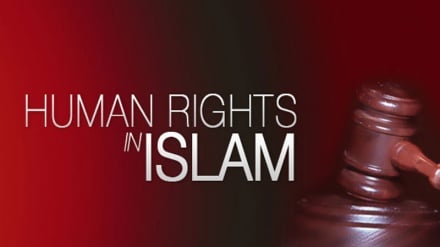Islamic human rights (8)
In this episode, we study the source of human rights in the sacred religion of Islam, and its difference to the West’s materialistic viewpoint.
Currently, what is known as the human rights rules and regulations has been the result and outcome of a sense of need for establishment of rules in the post-World War II era. In fact, the main incentive behind the preparation and presentation of human rights laws has been this sense of need. Lawmakers concluded that firstly rules and regulations compatible with the needs of the international community should be set, which would be viable across all countries. Secondly, the lawmakers noted that implementation of these laws should serve the common interests of all communities and shouldn’t just serve the interests of one or a few groups. Thirdly, the lawmakers believed that the articles of these rules and regulations should be rooted in the realities, and should not be founded on superstitions and false imaginations.
All of these assumptions are right and logical. What makes the difference is the existing discrepancies over the nature of boundaries between imaginations and realities; and over who is capable of recognizing these boundaries. In the view of materialistic lawmakers what is intangible is superstition. Hence, topics such as spirit and eternity are falsely imagined as superstitions by the materialistic lawmakers.
However, divine lawmakers believe that the source of rules and regulations is not limited to materialism, and in fact there are values which go beyond materialism, and are the embodiments of truth. Meanwhile, the common interests of mankind are in fact fulfilled by treasuring these divine values. This is because materialistic sources such as language, norms, and human tradition cannot originate unity and sustainability. So, we come to this conclusion that God Almighty is the best source for determination of human rights. God has bestowed all of these laws and rules and regulations to the entire mankind via sending prophets and promoting divine religions among humans.
In the last episode, we mentioned that God has created mankind, who is superior to other creatures due to his wisdom, resolve, and responsibilities. Thus, God sent prophets to assist and help human wisdom and to guide mankind in the material world until Hereafter. Furthermore, God bestowed heavenly and holy books to mankind to guide him throughout his life. The sacred religion of Islam which is the last and most comprehensive divine religion conveys humanitarian messages to the entire mankind. The divine religion of Islam invites all three members of the global family who are Muslims, non-Muslim monotheists, and disbelievers. Holy Quran conveys humanitarian messages for the entire mankind. Therefore, in our era, all divine rules and regulations have been expressed and are available for man.
Meanwhile, a few claim that Islamic rules and regulations belong to 1400 years ago and cannot be applied to the contemporary era. In other words, the question which might arise is that if Islam, Quranic teachings, and tradition of the Prophet of Islam and Infallible Imams are only source of human rights, what should one do in regard to new, countless developments and events which have taken place after the divine revelation of Holy Quran and presence of the Prophet of Islam and Infallible Imams?
Meanwhile, in response to this question, some groundlessly claim that Islam has only presented general principles and has not determined the quality of the ruling system and people’s lives. For instance, they say that Islam calls for regulation of lifestyle based on justice; however, the establishment of rules and regulations for attainment of this goal is shouldered by mankind.
This is a wrong and false response, because what the divine lawmaker has presented about human rights in Holy Quran and the traditions of the Prophet and Infallible Imams state all needs of mankind until the Day of Judgment, such as personal and social rules and regulations.
Many Islamic thinkers believe that Islam, in addition to determining the principles and values which govern human life, has specified all personal and social rules of regulations of mankind until the Day of Judgment.
According to Islamic books, all of the needs of mankind have been taken into consideration in Holy Quran and traditions of the Prophet and Infallible Imams. Hence, it cannot be claimed that Holy Quran and the tradition of the Prophet and Infallible Imams have not conveyed any message on topics related to the ruling system and human rights.
Meanwhile, it is clear that the outlines set by Holy Quran cannot be understood by everyone, and only the true exegetes of Holy Quran, who are the Infallible Imams, can understand them and elaborate these outlines for others. Thus, it should be said that all needs of mankind in any phase in time have been addressed and met in Holy Quran and tradition of Prophet of Islam, and Infallible Imams.
Although a long time has passed since the divine revelation of Holy Quran; prophet hood of the Prophet of Islam, Mohammad (Blessings of God upon him and his progeny), and the presence of Infallible Imams (Peace be upon them), and in the era of Major Occultation of the 12th Infallible Imam of the Prophet of Islam’s Household, Imam Mahdi (May God hasten his reappearance), it is not possible for the contemporary mankind to establish a direct link with the perfect human being; the dynamic Islamic theology and Ijtehad address the present day problems in man’s life. Therefore, as the result of Ijtehad, Islamic rules and regulations stay in line with the advances and progresses of human life.


